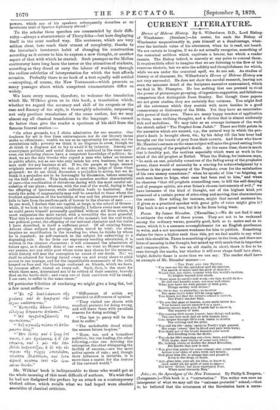Poems. By James Rhoades. (Macmillan.)—We do not find it easy
to estimate the value of these poems. They are not to be reckoned among the ordinary verses, passably good, both as to metre and as to sense, which it is a common accomplishment for an English gentleman- to write, and a not uncommon weakness for him to publish. Something claims for them a higher rank than this, yet we feel unable to say what rank this should be. There is something of grape in the form, and there are hints of meaning in the thought, but mixed up with much that is imperfect- and common-place. To use an old simile, in short, there is fire to be seen through the smoke, but whether it will ever shape itself into clear, bright, definite flame is more than we can say. The reader shall have. an example of Mr. Rhoades' manner :- " THE POET AND THE PEOPLE.
"You care not for the splendour and the passion,
The march of music and the glow of speech—
Would rest, not strive, content with this world's fashion, To heights beyond your reach.
"'Some must do earth's real work—we fain would do it—
Be dull and humble some, not soar and shine: What part have we with painter or with poet, Things earthly with divine ?'
" So %is to-day, so yesterday; to-morrow The same fool's fable will be sung again ; You dream not that the Artist's school is sorrow, The Poet's teacher Pain.
"Tie you that gape at heaven, scorn earth below it-- Your human nature narrow'd to a span : Heaven cannot teach you, if earth fail to show it, The majesty of man.
"The soaring bird stoops lowest; base things and noble, The seer sees each and all with human eyes, Cuts deeper through life's rock, intent to double • The striving and the prize.
"You call his life calm; spent in Truth's high quarrel, His songs 'sweet,' that in blood and pain were born; You think not of the brows beneath your laurel Bed-bleeding from the thorn: "You choke life's meaning out—love, tears, and laughter..
With vague, mad visions of some cold Ideal ; He, looking, trusts or doubts the dread Hereafter, But knows that now is reaL "You give him praise for some strange star, some comet Across your skies of alien birth and breath ; God gives him life, to plunge into and plumb it Even to the dregs of death.
"Aye, gives him, over all, his bliss, to know it,
And, under all, his gulfs of pain to span— Not more' but most supremely Poet, When most intensely Man."






























 Previous page
Previous page